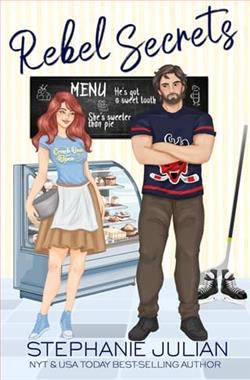Page 4 of The Goode Girls of Maple Lane
“We’re open until five today,” he says. “I’d love for you to meet her.”
“Same,” I say, and my eyes drift toward the photo of Marmie on my fridge, smiling like she’s looking on in spirit and letting me know I’m doing the right thing.
I grab a few more details from Andy so I can arrive prepared. As soon as we hang up, I look up the cost of an Uber. It’s almost $100 each way. Not ideal, especially since I’ll have to call in sick to Loden and Linden, the upscale furnishings store where I spend twelve tedious but well-paid hours every weekend, selling overpriced candles and textiles to bored housewives and affluent influencers who need tastefully curated props for their highly filtered lifestyle accounts.
A cab is even more expensive. I could take the bus but I’d have no way of getting a dog home with me. This shouldn’t be that hard,but my only close friend is on the other side of the Atlantic and my nearest living family member is on the West Coast.
A thought occurs to me. A long shot, for sure, but not an impossible one.
With a quick detour through my bathroom to pee, re-twist my tangled topknot into a slightly less deranged version, and swish some toothpaste, I scurry out my door and to the other end of the communal hallway, pausing before apartment 606. I know very few things about the current tenant. He likes plants. He likes corduroy and Converse. He has a kind smile. He often boards the elevator not from the main entry, but from the lower-level parking garage.
It’s not a lot to go on but I don’t have many options right now.
I take a deep breath and knock. A few seconds later, Plant Guy opens the door, blinking at me through old-fashioned, wire-rimmed glasses. His loose brown curls are in gentle disarray, the lower half of his face is faintly stubbled, and his pumpkin-colored sweater is rumpled, tugged sideways over a white crewneck tee and moss-colored cords.
A familiar jolt of anxiety sets in, a sharp discomfort with strangers I can’t shake off, even during an urgent animal rescue. My fingers flex and curl with a need to fidget, but I decide no one who wears a pumpkin-colored sweater can be all bad. Even if he steals houseplants.
I thrust out my hand.
“Hi,” I say. “I’m Cameron. Cameron Goode. I live in 602. Grad student. Veterinary medicine. Sorry if I’ve been... whatever. Doesn’t matter. I think you might have a car. And I just got a call about a dog who will be euthanized if I don’t go get her right away,and she’s in Syracuse, and she can’t walk, and I can’t lift her on my own, and Ireallylove dogs, and I think this one needs me. So... any chance you’re free and interested in saving a life with me?”
He continues blinking at me, completely nonplussed, and my stomach sinks.
He’s going to say no. Why shouldn’t he say no? Wouldn’t I say no if he came to my door and blurted out a plea to drop everything and go on what might be a completely invented rescue mission? I could be a dealer or a serial killer. Even if he threw aside all logic and decided to trust me, surely he has a job, or classes to study for, or a weekend hobby, or a social life, or a botany documentary series to binge. What possible reason could he have for helping me?
But then his kind smile appears, slowly building as he takes my hand and shakes it.
“Hi, Cameron,” he says. “I’m Everett Redmond. Give me a moment to grab my keys.”
Chapter Two
Everett’s car is a powder-blue, rust-tinged vintage Volvo station wagon he informs me was his grandmother’s before she died and left it to him. Then he apologizes for using the worddied. A silence follows that neither of us knows how to fill, until I say I’m sorry about his grandmother, but think it’s nice that he kept her CDs—an assortment of seventies-era light rock heavy on the Neil Diamond and John Denver—and that he listens to them in her memory. He tells me the CDs weren’t his grandmother’s. Another silence follows, one in which I have a new appreciation for childhood warnings not to get in cars with strangers. Not because I think Everett is dangerous, but because the two of us are trapped in here for the next hour and it only took us five minutes to demonstrate our combined lack of social skills.
I study a tomato sauce stain on the jeans I slept in and should’ve changed.
He finds a staticky college radio station to replace the music on his CDs.
We leave the outskirts of Ithaca behind and follow a winding surface road through the surrounding farmland and the woodedpatches that are just beginning to change color, hinting at the vibrant October hues that are still about a month away but always seem to arrive overnight, and then vanish just as quickly with the first hard autumn wind. When Everett reaches for the volume at the same time I reach for the tuner, our eyes meet, we exchange an apologetic smile that has the fortunate effect of resetting the mood, and I can feel us both rallying to try again.
I’m about to ask if he has always lived in Ithaca but he speaks first.
“So, you’re studying to be a vet?” he asks.
“Yeah,” I say, thankful for the easy topic. “It’s been my dream since I was a kid. I know it sounds cliché to say I’ve always loved animals, but I’ve always loved animals. They feel things in a way we’ll never fully understand or be able to emulate. Dogs especially. When they’re happy, they don’t question the meaning of that happiness, dissect its causes, or make ten-step plans for achieving it again. They don’t try to moderate their happiness in case the other dogs think their happiness is uncool. They don’t perform their happiness on social media, as if they’re only happy when their followers notice that they’re happy. They don’t manufacture their happiness. They don’t curate their happiness. They’re justhappy, in the moment, embodying the feeling without restraint, analysis, or pretense. Can you imagine?”
Everett nods as though he’s giving my impromptu speech serious consideration.
Or maybe he’s tallying how many times I said the wordshappyorhappiness.
“Sounds like you’ve given this a lot of thought,” he says.
I inch up a stiff shrug. “I have a lot of feelings about dogs.”
He slides me a sideways glance. “And about social media?”
“Guess I wasn’t so subtle about that.” I tug at a loose thread on the cross-strap of my seat belt, an obvious but necessary attempt to anchor my focus and buy myself some time.
Given the brevity of my acquaintance with Everett, I should probably refrain from telling him about my mother, and how social media became a platform for her unrelenting positivity, turning an annoying trait into an unbearable one. She gets sick. She posts about how lucky she is to have a perfect, doting husband who takes such amazing care of her. A friend receives a breast cancer diagnosis. She posts triumphant photos of a charity 5K she ran with a caption about how strong she feels, and how inspired she is by her friend’s “journey.” Our beloved family dog dies. She posts joyful videos from her long-awaited Italian vacation, the one she can finally take without worrying about leaving an old dog behind. There’s always a bright side, with a pretty picture and jaunty caption to ensure everyone else sees the bright side. I find it all exhausting.















